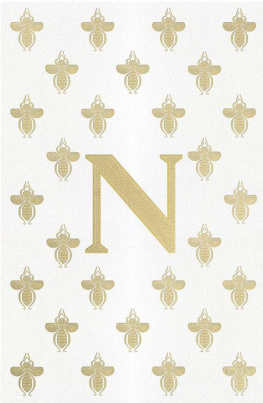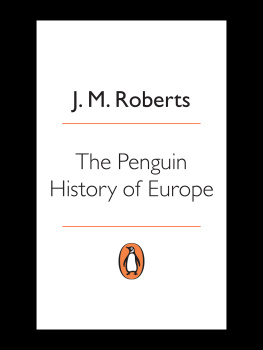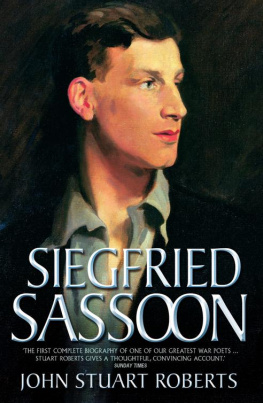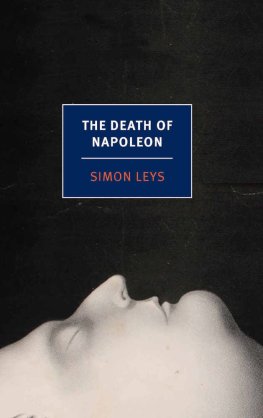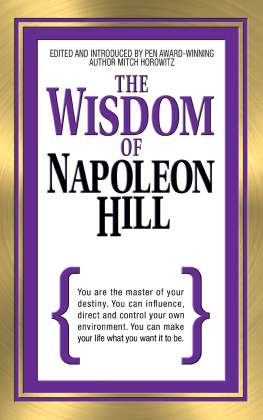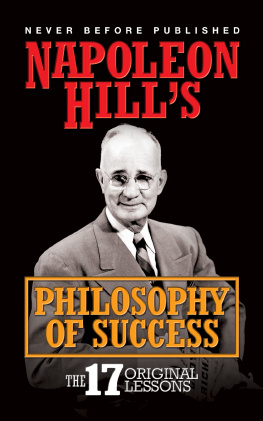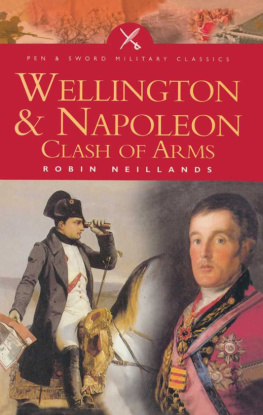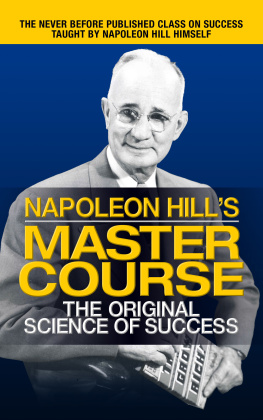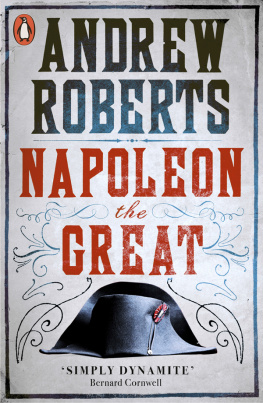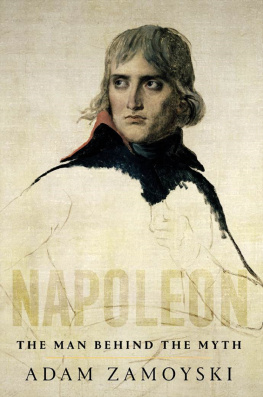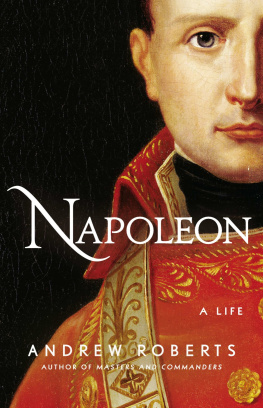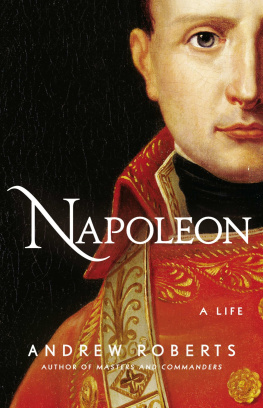Roberts - Napoleon the Great
Here you can read online Roberts - Napoleon the Great full text of the book (entire story) in english for free. Download pdf and epub, get meaning, cover and reviews about this ebook. year: 2014, publisher: Penguin Books Ltd, genre: Non-fiction. Description of the work, (preface) as well as reviews are available. Best literature library LitArk.com created for fans of good reading and offers a wide selection of genres:
Romance novel
Science fiction
Adventure
Detective
Science
History
Home and family
Prose
Art
Politics
Computer
Non-fiction
Religion
Business
Children
Humor
Choose a favorite category and find really read worthwhile books. Enjoy immersion in the world of imagination, feel the emotions of the characters or learn something new for yourself, make an fascinating discovery.
- Book:Napoleon the Great
- Author:
- Publisher:Penguin Books Ltd
- Genre:
- Year:2014
- Rating:4 / 5
- Favourites:Add to favourites
- Your mark:
- 80
- 1
- 2
- 3
- 4
- 5
Napoleon the Great: summary, description and annotation
We offer to read an annotation, description, summary or preface (depends on what the author of the book "Napoleon the Great" wrote himself). If you haven't found the necessary information about the book — write in the comments, we will try to find it.
Napoleon the Great — read online for free the complete book (whole text) full work
Below is the text of the book, divided by pages. System saving the place of the last page read, allows you to conveniently read the book "Napoleon the Great" online for free, without having to search again every time where you left off. Put a bookmark, and you can go to the page where you finished reading at any time.
Font size:
Interval:
Bookmark:


PART ONE
Rise
PART TWO
Mastery
PART THREE
Denouement
To my siblings, Ashley Gurdon and Matthew and Eliot Roberts
Endpapers: Louis Lafitte, drawing of General Bonaparte (detail). Bibliothque Thiers, Paris. Photograph RMN-Grand Palais / Agence Bulloz




In October 1944, just as the Netherlands was being liberated from the Nazis, the great Dutch historian Pieter Geyl completed one of the most original books of the many tens of thousands about Napoleon which have appeared over the past 215 years. Its originality lay not in Geyls own view of Napoleon (though the book certainly made plain what he thought of him) but in its recounting of the views of others, and in the way it traced the different phases of Napoleons reputation between 1815 and his own time. Because Napoleon was such a gigantic figure in the political as well as the historical landscape throughout the nineteenth century and the early twentieth, both romanticized and vilified to a high degree, the views which Geyl distilled were (unsurprisingly) often diametrically opposed to each other, generally reflecting their authors own political stances. After Geyl wrote also unsurprisingly, but I believe misleadingly the experience of Europe during the Second World War coloured many interpretations of events on the continent during Napoleons era, and still sometimes casts a shadow over them.
In writing this book, I have tried not to be overly influenced by previous interpretations, but to go back so far as possible to Napoleons own words and the words of those who knew him personally. Of course, visceral disagreement about him extends there too: almost all the contemporary accounts are heavily slanted according to the situation their authors had occupied during Napoleons lifetime or afterwards. For those writing immediately after his abdication, the lure of employment or a pension, or merely the right to publish under the Bourbons, wrecked objectivity in dozens of cases. For example, the letters of Claire de Rmusat to her husband, one of Napoleons courtiers, between 1804 and 1813 were affectionate about the Emperor, but by 1818 her memoirs painted him as a monster incapable of generosity who, moreover, had a satanic smile. What happened in between was that her husband wanted a job as the prefect of a department from the Bourbons. She had burned her contemporaneous notes in 1815, and tried to resuscitate what Chateaubriand called her memories of memories.
Or again: much of our received understanding of Napoleon has been coloured by the highly dubious memoirs written by his former classmate Louis-Antoine de Bourrienne. Appointed Napoleons private secretary during the negotiations with Austria in Leoben in 1797, Bourrienne was then no longer permitted to use the familiar tu with Napoleon, which he said was an easy sacrifice for the honour of becoming head of his cabinet (private office), but Napoleon had to sack him twice for corruption and they parted on bad terms. His memoirs have been treated as being generally objective by historians, even though they were actually written by (among others) the fantasist Charles Maxime de Villemarest. In 1830 a two-volume book totalling eight hundred pages was published by people who knew Napoleon well, including his brother Joseph, which forensically demolished scores of Bourriennes claims. I have used Bourrienne sceptically, and only to illustrate my accounts of occasions when he was known to have been personally present.
Such contemporary sources which need to be treated with caution are everywhere in the Napoleonic canon. The Comte de Montholon, who was with Napoleon on St Helena, wrote his supposed narrative of his time on the island twenty years later, without contemporaneous notes, and his memoirs were ghosted by the novelist Alexandre Dumas, who also ghosted those of Napoleons favourite actor Talma. Laure dAbrants was banned from Paris by Napoleon in 1813, and by the time her memoirs appeared in the 1830s she was an opium addict who nonetheless claimed to have remembered verbatim long, intimate conversations with the Emperor. Several of her eighteen volumes of memoirs were ghosted by Balzac and written to stave off creditors. Those of Napoleons police chief Fouch were actually written by the hack-writer Alphonse de Beauchamp; those of one of Napoleons favourite mistresses, Mademoiselle George, were also drawn up by a ghost-writer, but she found them so boring that she sexed them up, with stories of Napoleon shoving wads of banknotes down her corset.
In the period before copyright laws, people could even publish memoirs that were supposedly written by living participants such as Joseph Bonaparte, Marshal Marmont and Napoleons foreign minister Armand de Caulaincourt without their having any legal recourse. A fraud called Charlotte de Sor published what she claimed were Caulaincourts memoirs in 1837 on the basis of having briefly met him in 1826 (his real memoirs werent published until 1934). Although the Napoleonic sections of Talleyrands memoirs were written by him in the 1820s, they were extensively rewritten in the 1860s by the profoundly anti-Napoleonic Adolphe de Bacourt. Prince Metternichs memoirs were ghosted too, as well as being immensely self-serving; those of Paul Barras, who at one time was Josephines lover, are a monument to malice, self-pity and would-be revenge against Napoleon. The man Napoleon overthrew in the Brumaire coup, Louis Gohier, promised in the introduction to his memoirs that he was an impartial writer who would give full justice to Napoleon, yet they are in fact little more than two volumes of bitter ranting. Neither the minister Lazare Carnot nor Marshal Grouchy wrote their own memoirs either, but had them drawn up from documents they left, some contemporaneous, others not. The diplomat Andr-Franois Miot de Melitos so-called memoirs were written by his son-in-law over half a century after the events they describe.
Nonetheless, because so many people wanted to record their impressions of this extraordinary man, there are also plenty of memoirs from people close to Napoleon who kept contemporaneous notes and didnt decry him so that they could find jobs under the incoming regime or exaggerate their intimacy with him in order to make money. The credibility of the Marquis de Caulaincourts accounts of 181214, of Henri Bertrands diary of events on St Helena and of Cambacrs memoirs, for example, is greatly enhanced by the fact that they were not written for immediate publication, only emerging in the 1930s, 1950s and 1970s respectively. The memoirs of the little-known Baron Louis de Bausset-Roquefort, who as prefect of Napoleons palace was closer to him than Bourrienne, were bravely published during the Bourbon period, and equally balanced pictures were drawn by Napoleons two private secretaries after Bourrienne, namely Claude-Franois de Mneval and Agathon Fain. Of course they all need to be checked against what we know from other sources, and against each other, but once that is done they tend to present a more coherent and credible portrait of the Emperor than the Black Legend painted by his enemies and their ghost-writers soon after his death.
Font size:
Interval:
Bookmark:
Similar books «Napoleon the Great»
Look at similar books to Napoleon the Great. We have selected literature similar in name and meaning in the hope of providing readers with more options to find new, interesting, not yet read works.
Discussion, reviews of the book Napoleon the Great and just readers' own opinions. Leave your comments, write what you think about the work, its meaning or the main characters. Specify what exactly you liked and what you didn't like, and why you think so.

